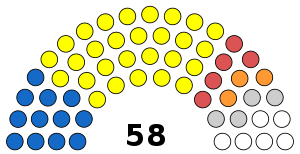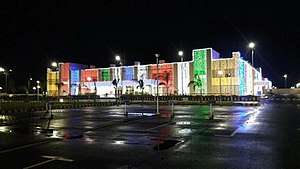Andhra Pradesh Legislative Council
The Legislative Council of Andhra Pradesh or Andhra Pradesh Śāsana Manḍali is the upper house of the legislature of the Indian state of Andhra Pradesh; the lower house being the Andhra Pradesh Legislative Assembly. It is situated in the state capital of Amaravati, and has 58 members. The Vidhan Parishad has been in existence in two spells - from 1958 to 1985, and from 2007 continuing till today. A resolution has been passed by AP government for dissolution of the house which awaits parliament ratification.
Andhra Pradesh Legislative Council | |
|---|---|
| Type | |
| Type | |
Term limits | 6 years |
| Leadership | |
Chairman | |
Leader of the House | |
Leader of the Opposition | |
| Structure | |
| Seats | 58 (50 Elected + 8 Nominated) |
 | |
Political groups | Government (12)
Opposition (28)
Others (12) Vacant (6)
|
| Elections | |
| Single transferable vote | |
| Meeting place | |
 | |
| Council Building Amaravati, Andhra Pradesh, India | |
| Website | |
| http://www.aplegislature.org/web/legislative-council | |
History
In the first years since its creation in post-independence India, the state of Andhra Pradesh worked under a unicameral parliamentary system. On 5 December 1956, the Andhra Pradesh Vidhana Sabha passed a resolution calling for the creation of an upper house, the Vidhan Parishad, to transition to a bicameral system. The members of the majority party/coalition in the lower house would be the ruling party of the upper house, regardless of number. The house will have a chairman who conducts day-to-day affairs, rather than a speaker.[1] The Vidhan Parishad was formed officially on 1 July 1958 under article 168 of the Constitution of India. The first President of India, Dr. Rajendra Prasad inaugurated the Vidhan Parishad on 8 July 1958.[1]
Abolition in 1980
In the 1980s, Andhra Pradesh became one of the first states to seek the abolition of the upper houses, which were being increasingly criticised as being unnecessary, unrepresentative of the population, a burden on the state budget and causing delays in passing legislation.[1][2][3][4] However, the move was criticised as an attempt by the then-ruling party, the Telugu Desam Party (TDP), to deny their main political opposition, the Indian National Congress (then Congress (I)) of influence in the state government and the control of the upper house, which could delay TDP-sponsored legislation and where the TDP held no seats.[4] In accordance with a resolution passed by the Andhra Pradesh Vidhan Sabha, the Indian Parliament abolished the Vidhan Parishad through the Andhra Pradesh Legislative Council (Abolition) Act in 1985, after the Congress (I) suffered a major defeat in the state elections in Andhra Pradesh.[1][4]
Revival in 1989
Subsequent attempts were made to revive the Legislative Council under Chief Minister Dr. Marri Chenna Reddy, who belonged to the Congress (I), which had won the state elections in 1989.[1][4] A resolution to revive the Legislative Council was passed in the Vidhan Sabha on 22 January 1990.[1] The Rajya Sabha, the upper house of the Indian Parliament, passed legislation authorising the revival of the Legislative Council as per the resolution of the state Vidhan Sabha on 28 May 1990, but the legislation stalled in the lower house, the Lok Sabha, primarily due to its dissolution in 1991 before the completion of its five-year term.[1] The subsequent Lok Sabhas (1991–1996, 1996–1998, 1998–2004) did not take any further action.
After its victory in the 2004 state elections, the Congress-led Andhra Pradesh Legislative Assembly passed another resolution on 8 July 2004 calling for the revival of the Legislative Council.[1] This time it was introduced in the Lok Sabha as the Andhra Pradesh Council Bill on 16 December 2004. On 15 December 2006 the Lok Sabha passed the legislation, which was quickly passed by the Rajya Sabha on 20 December, and received the assent of the President on 10 January 2007.[1] The newly revived Legislative Council was constituted on 30 March 2007 and inaugurated on 2 April by Rameshwar Thakur, the Governor of Andhra Pradesh.[1]
Second abolition in 2020
Andhra Pradesh Legislative Assembly made and passed the resolution for abolition of the Legislative Council on 27 Jan 2020.
Designations and present members
The Chairman, elected by the Council, presides over the sessions of the Council. The Deputy Chairman is also elected to preside in the Chairman's absence.
Presiding Officers
| Designation | Name |
|---|---|
| Governor | Bhiswa Bhushan Harichandan |
| Chairman | Shariff Mohammed Ahmed, TDP |
| Deputy Chairman | Reddy Subrahmanyam |
| Leader of the House | Pilli Subhash Chandra Bose, YSRCP |
| Leader of the Opposition | Yanamala Rama Krishnudu, TDP |
| Secretary of Legislative Council | M. Vijaya Raju |
Members
| No | Party | Members |
|---|---|---|
| 1 | Telugu Desam Party | 28 |
| 2 | YSR Congress Party | 12 |
| 3 | Progressive Democratic Front | 5 |
| 4 | Bharatiya Janata Party | 3 |
| 5 | Independent | 4 |
| 6 | Vacant | 6 |
| - | Total | 58 |
Membership and tenure
The Legislative Council is a permanent house, not subject to dissolution.[1] Its 58 members serves six-year term, and every two years, one-third of the total number of members "retire" in rotation, and undergo the re-election process.[1] To become a member, the individual must be a citizen of India and at least 30 years of age. 8 members of the Council are nominated by the Governor of Andhra Pradesh. 40 members are elected by an electoral college of the Legislative Assembly and local governing bodies. The 10 remaining members would be elected from constituencies of college graduates and teachers.[5]
Elected By Members Of Legislative Assembly
Keys: TDP (10) YSRCP (8) BJP (1) Vacant (1)
| # | Member | Party | Term | |
|---|---|---|---|---|
| 1. | Yanamala Ramakrishnudu | Telugu Desam Party | 29-03-2025 | |
| 2. | Parchuri Ashok Babu | Telugu Desam Party | 29-03-2025 | |
| 3. | Duvvarapu Rama Rao | Telugu Desam Party | 29-03-2025 | |
| 4. | B Tirumala Naidu | Telugu Desam Party | 29-03-2025 | |
| 5. | Nara Lokesh | Telugu Desam Party | 29-03-2023 | |
| 6. | Batchula Arjunudu | Telugu Desam Party | 29-03-2023 | |
| 7. | Shariff Mohammed Ahmed | Telugu Desam Party | 24-05-2021 | |
| 8. | Vattikuti Veera Venkanna Chowdary | Telugu Desam Party | 29-03-2021 | |
| 9. | Gundumala Thippe Swamy | Telugu Desam Party | 29-03-2021 | |
| 10. | Gummidi Sandhya Rani | Telugu Desam Party | 29-03-2021 | |
| 11. | Janga Krishna Murthy | YSR Congress Party | 29-03-2025 | |
| 12. | Challa Ramakrishna Reddy | YSR Congress Party | 29-03-2023 | |
| 13. | Mopidevi Venkata Ramana Rao | YSR Congress Party | 29-03-2023 | |
| 14. | Gangula Prabhakar Reddy | YSR Congress Party | 29-03-2023 | |
| 15. | Pothula Suneetha | YSR Congress Party | 29-03-2023 | |
| 16. | Devasani Chinna Govinda Reddy | YSR Congress Party | 24-05-2021 | |
| 17. | Shaik Mohammed Iqbal | YSR Congress Party | 29-03-2021 | |
| 18. | Pilli Subhash Chandra Bose | YSR Congress Party | 29-03-2021 | |
| 19. | Somu Veerraju | Bharatiya Janata Party | 24-05-2021 | |
| 20. | Vacant | 29-03-2023 | ||
Elected from Local Authorities constituencies
TDP (14) YSRCP (1) BJP (1) Independent (1) Vacant (3)
| # | Constituency | Member | Party | Term | |
|---|---|---|---|---|---|
| 1. | Chittoor | B.N. Rajasimhulu | Telugu Desam Party | 01-05-2023 | |
| 2. | West Godavari | Angara Ramamohan | Telugu Desam Party | 01-05-2023 | |
| 3. | West Godavari | Manthena Venkata Satyanarayana Raju | Telugu Desam Party | 01-05-2023 | |
| 4. | East Godavari | Chikkala Ramachandra | Telugu Desam Party | 01-05-2023 | |
| 5. | Srikakulam | Satrucharla Vijaya Rama Raju | Telugu Desam Party | 01-05-2023 | |
| 6. | Nellore | Vakati Narayana Reddy | Bharatiya Janata Party | 01-05-2023 | |
| 7. | Kurnool | K.E. Prabhakar | Independent | 01-05-2023 | |
| 8. | Kadapa | Mareddy Ravindranath Reddy | Telugu Desam Party | 29-03-2023 | |
| 9. | Anantapur | Gunapati Deepak Reddy | Telugu Desam Party | 29-03-2023 | |
| 10. | Vizianagaram | Dwarapureddi Jagadeeswara Rao | Telugu Desam Party | 18-06-2021 | |
| 11. | Chittoor | Gali Saraswathi | Telugu Desam Party | 18-06-2021 | |
| 12. | East Godavari | Reddy Subrahmanyam | Telugu Desam Party | 18-06-2021 | |
| 13. | Krishna | Buddha Venkateswara Rao | Telugu Desam Party | 18-06-2021 | |
| 14. | Krishna | Y.V. Babu Rajendra Prasad | Telugu Desam Party | 18-06-2021 | |
| 15. | Visakhapatnam | Pappala Chalapathirao | Telugu Desam Party | 18-06-2021 | |
| 16. | Visakhapatnam | B. Naga Jagadeeswara Rao | Telugu Desam Party | 18-06-2021 | |
| 17. | Guntur | Ummareddy Venkateswarlu | YSR Congress Party | 18-06-2021 | |
| 18. | Guntur | Vacant | TBD | 18-06-2021 | |
| 19. | Prakasam | Vacant | TBD | 18-06-2021 | |
| 20. | Anantapur | Vacant | TBD | 18-06-2021 | |
Elected from Graduates constituencies
| # | Constituency | Member | Party | Term | |
|---|---|---|---|---|---|
| 1. | East Godavari,West Godavari | Illa Venkateswara Rao | Progressive Democratic Front | 30-03-2025 | |
| 2. | Krishna,Guntur | Kalagara Sai Lakshmana Rao | Progressive Democratic Front | 30-03-2025 | |
| 3. | Chittoor, Nellore,Prakasam | Yandapalli Srinivasulu Reddy | Progressive Democratic Front | 29-03-2023 | |
| 4. | Anantapur,Kurnool,Kadapa | Vennapusa Gopal Reddy | YSR Congress Party | 29-03-2023 | |
| 5. | Srikakulam,Vizianagaram,Visakapatnam | P. V. N. Madhav | Bharatiya Janata Party | 29-03-2023 | |
Elected from Teachers constituencies
PDF (2) Independent (3)
| # | Constituency | Member | Party | Term | |
|---|---|---|---|---|---|
| 1 | Srikakulam,Vizianagaram,Visakhapatnam | Pakalapati Raghu Varma | Independent | 30-03-2025 | |
| 2 | Chittoor,Nellore,Prakasam | Vitapu Balasubrahmanyam | Progressive Democratic Front | 29-03-2023 | |
| 3 | Anantapur,Kurnool,Kadapa | Katti Narasimha Reddy | Independent | 29-03-2023 | |
| 4 | East Godavari,West Godavari | Ramu Surya Rao | Progressive Democratic Front | 29-03-2021 | |
| 5 | Krishna,Guntur | A. S. Ramakrishna | Independent | 29-03-2021 | |
Nominated Members
| # | Constituency | Member | Party | Term | |
|---|---|---|---|---|---|
| 1. | Kurnool | N. M. D. Farooq | Telugu Desam Party | 20-07-2023 | |
| 2. | Chittoor | Gownivaari Sreenivasulu | Telugu Desam Party | 11-06-2021 | |
| 3. | Nellore | Beeda Ravichandra | Telugu Desam Party | 11-06-2021 | |
| 4. | Krishna | T.D. Janardhan | Telugu Desam Party | 11-06-2021 | |
| 5. | Kadapa | Chadipiralla Sivanatha Reddy | YSR Congress Party | 20-07-2023 | |
| 6. | Anantapur | Pamidi Samanthakamani | YSR Congress Party | 11-06-2021 | |
| 7. | Vacant | ||||
| 8. | Vacant | ||||
References
- "Andhra Pradesh Legislative Council History". National Informatics Centre. Retrieved 3 September 2010.
- Sharma. Introduction to the Constitution of India, Fifth Edition. PHI Learning Pvt. Ltd. pp. 212–13. ISBN 978-81-203-3674-2.
- Laxmikanth. Indian Polity For UPSC 3E. Tata McGraw-Hill. pp. 27–1. ISBN 978-0-07-015316-5.
- Agarala Easwara Reddy (1994). State politics in India: reflections on Andhra Pradesh. M.D. Publications Pvt. Ltd. pp. 97–110. ISBN 978-81-85880-51-8.
- TMH General Knowledge Manual. Tata McGraw. 2007. p. 176. ISBN 978-0-07-061999-9.